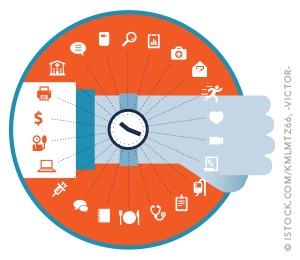
It's easy to feel impatient with ourselves and others these days. But research suggests impatience can be bad for our health. Here's a better way to respond.
Fam Pract Manag. 2020;27(4):43-44
Author disclosures: no relevant financial affiliations disclosed.

We are living through a time with many questions and few answers. Guidance changes quickly, making it hard to know what to believe. How far apart should we really keep from each other? Are masks really helpful? Will there be enough personal protective equipment (PPE)? As things reopen, is it really safe to go out again? When will there be a vaccine?
The uncertainties affect so many parts of our lives, including not only how we provide care but also our daily routines, relationships, parenting, exercise, worship, socializing, and hobbies. All of these fluctuations are further complicated by recent economic changes, including furloughs, pay cuts, and eroding financial stability for our practices.
We get daily reports on numbers of infections, patients under investigation, deaths, PPE availability, and intensive care beds. We read speculation about when the surge will hit and how long it will last.
We wonder how to plan, both personally and professionally. How can we take care of our own health and that of our families as we care for our patients, coworkers, and struggling health care systems?
With modern technology, many of us are prone to impatience generally. We expect instant gratification based on our experiences with Amazon Prime, DoorDash, Google, and microwave cooking. During this pandemic, it's easy to feel even more impatient — with ourselves, with others, and with circumstances. However, impatience can rob us of the gifts of the present; it can make us feel like we are constantly running, which prevents us from accepting the current moment. Research reveals connections between impatience and heart problems, loneliness, depression, and even shorter telomeres, which may speed up aging.1,2
On the other hand, research has found patience to be related to higher life satisfaction and meaning, lower depressive symptoms, enhanced self-esteem, higher self-control, and enhanced ability to accomplish goals.3,4 How can we be more patient with ourselves and each other? How can we pace ourselves during this time of great uncertainty?
Patience has been defined as the “ability to be calm in the face of adversity, frustration, or suffering.”1 Certainly the COVID-19 pandemic is presenting us with a great deal of adversity, frustration, and suffering. How do we want to respond? Patience is a muscle; just like any training, patience takes commitment and practice to develop. As we build the muscle, patience can offer a sense of inner calm, peace, and confidence.
TEN TIPS
Here are 10 tips for promoting patience in ourselves and with others during this time.
1. Reflect on your experience when you feel impatient. Mindful awareness of our impatient experience is the first step to patience.
What emotions manifest? You might feel irritability, frustration, fear, anxiety, or sadness.
What behaviors manifest? Perhaps you find yourself distancing (physically or emotionally) or isolating, having angry outbursts, acting impulsively, demanding, nagging, or overreacting in relationships. You might be losing motivation on projects, or increasing substance use.
How has your thinking changed? Are you jumping quickly to conclusions, being forgetful, catastrophizing, or having difficulty concentrating?
How do you feel impatience in your body? You might be experiencing headaches, tension, stomach distress, muscle aches, worsened chronic pain, increased blood pressure/heart rate, or sweaty palms.
2. Reflect on your personal triggers. What do you know sparks frustration and reactivity in you? How can you choose to respond differently?
3. Practice gentleness and compassion. Everyone is under stress. Many work processes have changed. Consider that everyone is truly doing their best — including you.
4. Focus on what you can control. If possible, take some small action.
5. Focus on the good. When feeling disillusioned about your losses, call to mind the good that is here now, including new opportunities and what you can be grateful for.
6. Pick an absorbing project and immerse yourself in it. Some options include gardening, doing a jigsaw puzzle, cooking homemade meals, or even playing video games. Recent research from the apex of COVID-19 in China suggests that engaging in projects that promote flow — the state of complete immersion in an optimally challenging activity — might be one of the best ways to combat worry during the uncertain waiting periods of quarantine.5
7. Regularly practice an activity that improves your body or mind. Examples include exercise, yoga, mindfulness exercises, or meditation.
8. Maintain hope. We will get through this. Our health care system will not be the same as before the pandemic, but we're creating new processes and ways to care for patients that will serve us both today and in post-pandemic times.
9. Reconnect with your purpose and why you chose a career in medicine. Cultivating a purpose bigger than ourselves can help motivate us for the hard work of being patient because it answers the question of why we are waiting or suffering. How does being a health care provider relate to what gives your life meaning?
10. Take a deep breath (through the facemask if need be) and repeat, repeat, repeat.
